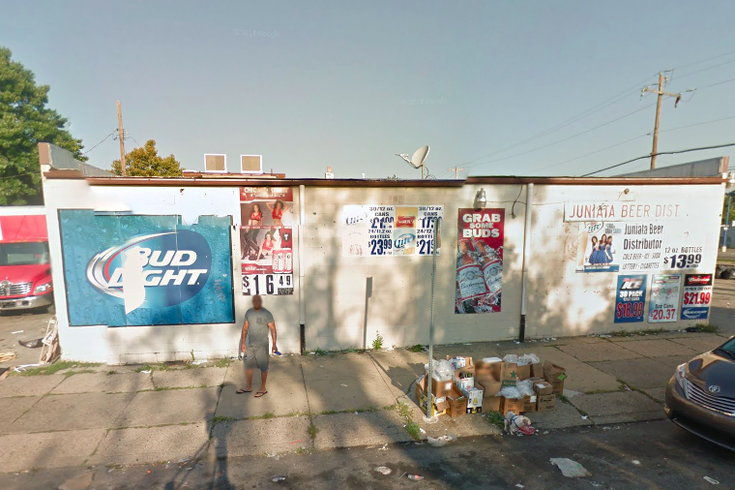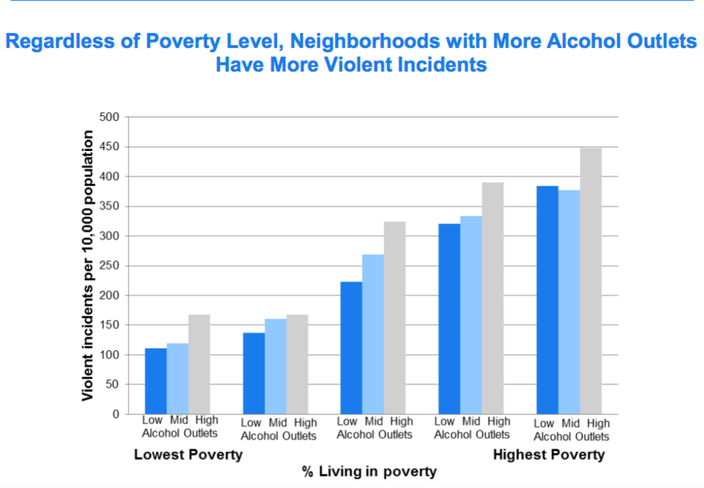
January 24, 2017
 Source/Google Street View
Source/Google Street View
Juniata Beer and Soda Distributors at 1062 E. Lycoming St. in North Philadelphia.
The greater the availability of alcohol in a given Philadelphia neighborhood, the higher the likelihood of violence will be, according to a new review of crime data by researchers at Drexel University's Dornsife School of Public Health.
In a partnership with the city of Philadelphia, Drexel's Urban Health Collaborative looked at the density of "off-premise" alcohol outlets across the city and compared their findings to the number of violent incidents in those areas, noting the racial and socioeconomic relationships that impact the distribution of both data sets.
Throughout Philadelphia, the average density of alcohol outlets was 2.2 per square mile, significantly lower than the 10-plus outlets per square mile in cities like Baltimore, New Orleans and Los Angeles. In the city's poorest neighborhoods, however, the average density of alcohol outlets was 3.5 per square mile, compared to less than 2 per square mile in Philly's wealthiest neighborhoods.
A review of 2015 and early 2016 crime data found that the poorest neighborhoods with greater access to alcohol had higher rates of violence. Even in the city's wealthiest neighborhoods — those with less than 7 percent below the federal poverty line — there were more violent incidents when the density of alcohol outlets was at least 6 per square mile.
"As many people know, excessive alcohol use can lead to aggressive and violent behaviors, death, victimization, injury and vehicle accidents,” said Amy Auchincloss, associate professor in the Dornsife School of Public Health. “What many people don’t know is that alcohol availability is linked to a host of serious health problems.”
To recap the findings of the study, the Philadelphia Department of Public Health compiled a report with a series of charts breaking down the relationship between violence and alcohol sales.
 Source/Philadelphia Department of Public Health
Source/Philadelphia Department of Public HealthCHART.
"The current concentration of alcohol outlets in low-income neighborhoods in Philadelphia suggests that the adverse effects are likely to be felt most by those who already suffer from social disadvantage," the city concluded in its report. "Community organizations, healthcare providers, and others who serve the most vulnerable should be prepared to address the potential health and social effects of greater alcohol use."
Drexel's latest findings build on a previous study that examined the effects of liquor privatization in Washington state after Initiative 1183 was enacted in 2012. That study subsequently found a dramatic increase in rates of both aggravated and non-aggravated assault. The study raised concerns about the unintended consequences of liquor privatization in states like Pennsylvania, where Gov. Tom Wolf has loosened some of the commonwealth's most stringent laws but favors modernizing the state-controlled system over outright privatization.
To address the problems identified in the study, city agencies are developing evidence-based addiction prevention curricula for use in schools and community centers. They're also working with treatment providers to arrange help for those dependent on alcohol and other drugs.
“Alcohol is a drug that increases the risk of injuries of all sorts, including violent injuries,” said Thomas Farley, Philadelphia’s health commissioner. “This study should make us concerned about the effect of widening the availability of alcohol on violence in Philadelphia neighborhoods.”